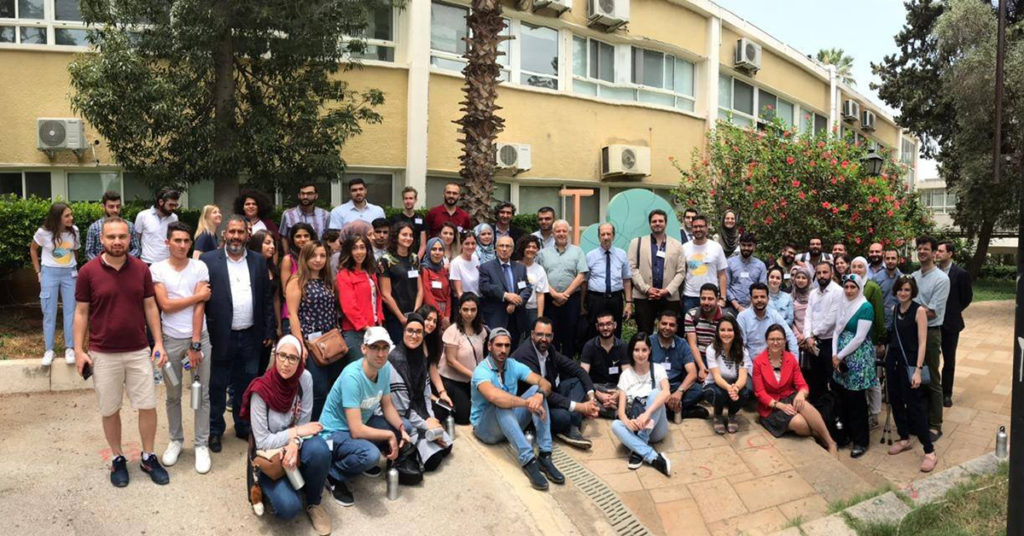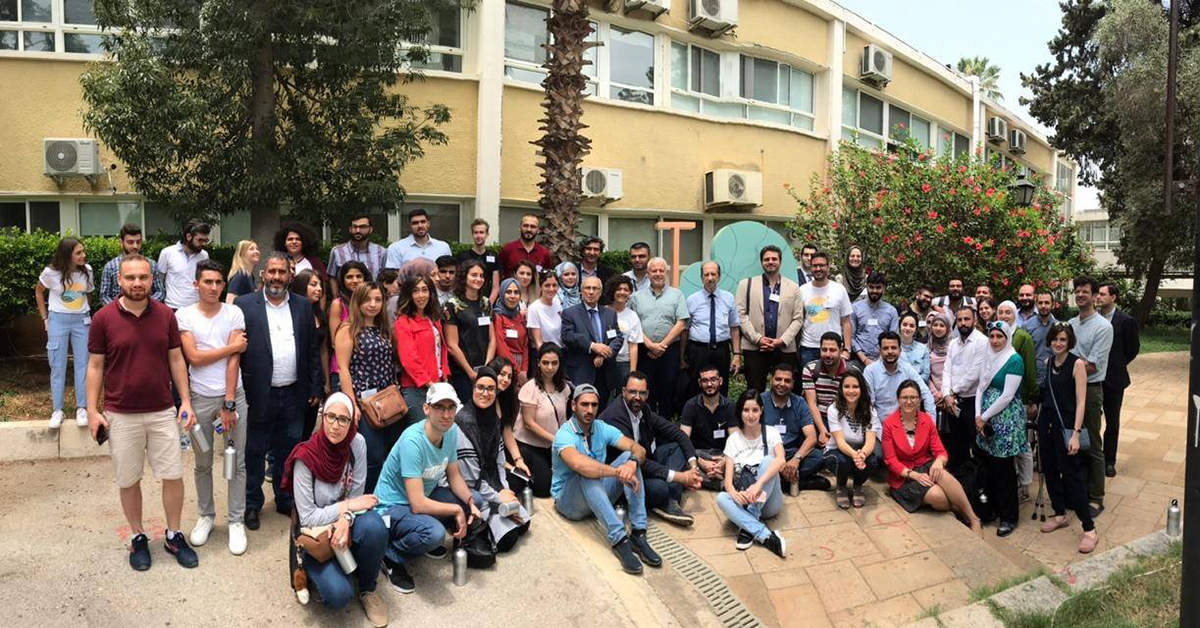
70 participants from Lebanon, Jordan and Syria, young community leaders, engineers, architects, entrepreneurs, professionals and experts joined the first Water Innovation Lab in Lebanon (WIL Lebanon) for one week in the Bekaa Valley at the American University of Beirut’s AREC, to explore, study and resolve some of Lebanon’s most pressing water challenges.
One week of field tours, innovation masterclasses, mentorship sessions, and design thinking training resulted in 13 collaborative innovation projects designed and led by young leaders.
Addressing challenges along the Litani River
Waterlution– the Canadian organization that hosted this program in 10 countries to date, focused this Lebanese edition on addressing industrial, agricultural and displaced communities challenges along the Litani River with UNICEF, the Embassy of Switzerland in Lebanon and the American University of Beirut as leading partners, alongside many institutional and community partners including Berytech, the Embassy of Canada in Lebanon, UNDP, UNESCO, Injaz Lebanon, USAID, CEWAS, and Difaf.
Dona Geagea, global lead for the Water Innovation Labs, recaps on the experience of having the event for the first time in Lebanon, “Water Innovation Lab Lebanon was the tenth global event that Waterlution hosts, the first in the Arab world and the biggest water innovation event dedicated to youth in the Middle East.
From this regard, being Lebanese Canadian, I wanted to make this event happen since I started working with Waterlution 8 years ago, and it gives me so much joy and pride to see that with support from Waterlution, the WIL Lebanon team and partners, we achieved this goal.
Almost 80% of participants who joined us had no connection to water-specific events, programs or any kind of water-specific support before, so we definitely see a gap in the water-specific space for connecting youth and empowering them with skills in decision making, leadership, innovation and creating a network that could connect them in Lebanon.
We are really proud that we were able to incorporate people with very diverse backgrounds in the event: 45% students, 30% professionals, 10% youth coming from underprivileged communities and 15% transitioning into employment with areas of expertise ranging in agriculture, hydrogeology, Biomed, architecture, and environmental sciences.”
5 Final Innovative Projects
13 final collaborative and innovative projects were presented in the event to address water challenges and to improve water use, in front of an expert panel. The winners were:
- Fid w Stafid – reusing treated wastewater from Zahle treatment plant for agriculture – won the Swiss Cooperation Office $5000 Seed Grant.
- Moukafahat al Zibar – reducing water waste and heavy metal contamination from Olive mills – won the AUB Seed Grant and Mentorship Award $5000 and the CEWAS Mentorship Award.
- Time to Act – addressing the problem of bacteria resistant to antibiotics in the Litani river – won AUB Seed Grant and Mentorship Award.
- HydroCrop – incentivizing farmers to input data into an App to reduce water loss and increase accountability – won the Berytech Award to participate in the Agrytech Hackathon.
- Joud bel May Joud – clever social media campaign to increase awareness of virtual water and reduce overconsumption at a local scale – won the CEWAS Blue Peace Media Lab Award.
All this young talent converged at the first WIL Lebanon, to equip Lebanon’s future water leaders with tools to think holistically, design innovatively, and communicate across sectors, creating valuable water solutions. With this resounding success in Lebanon, plans are in place to organize this event again next year.
“I am very proud of what the Lebanese youth were able to contribute not only in ideas but also in passion and engagement. They were ready to receive and learn and when we challenged them beyond their limits, they were ready to go along,” beams Geagea. “The 13 co-innovation projects that emerged surpassed our expectations. We see a lot of potential to really enable an ecosystem for youth-led water initiatives in Lebanon.”
Berytech’s intervention
Ramy Boujawdeh, Deputy GM of Berytech, had the chance to meet the participants during the event, “Water is a scarce resource crucial to multiple sectors whether agriculture, urban or industrial. We’ve been working to push water innovations within Berytech’s work in supporting innovation and youth entrepreneurship especially under programs encompassing sustainability and agri-food innovation. Partnering with Waterlution for the WIL Lebanon event allows us to drive our support for water innovation even further.”
He continued that he had the chance to meet the 70 participants to explain to them how they could benefit from the ecosystem and Berytech’s offering, emphasizing how this one week of experimentation could lead them to something bigger, that can improve the entire sector.
Berytech offered one of the five winning teams direct access to participate in the upcoming Agrytech Hackathon.
“Waterlution and Berytech are discussing two areas of collaboration moving forward. One is to create, besides the yearly WIL event, an ongoing program to keep the network alive and to provide continuous training while involving new youth in the network. The second is to create a flow of knowledge transfer between the Water Innovation Labs happening worldwide and Lebanon and work with Berytech to build this interlinkage especially in Mediterranean initiatives,” wraps Geagea.
About Waterlution– A Water Learning Experience
Waterlution is a Canadian non-profit with 15 years of experience facilitating multi-stakeholder dialogue and capacity building for young leaders in the water sector. Its Canadian and international workshops, hub events and Water Innovation Labs, as well as facilitation skills-building methods have engaged 6000+ participants with the transformative skills needed to become leaders in the future of water.








